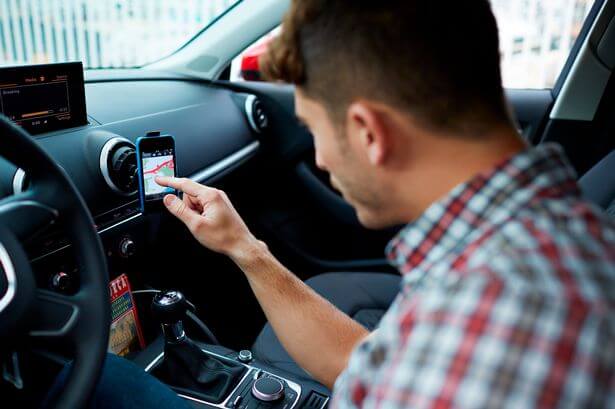 I am sure you are aware by now that using your mobile phone for while driving is illegal.
I am sure you are aware by now that using your mobile phone for while driving is illegal.
But you may not realise that using it for sat nav directions could get you in trouble are well, I was not aware of this until today either. There’s a right way and a wrong way to go about it, and improper use might lead to points on your licence and £200 fine, and can also have serious implications for your insurance.
Here are a few tips to keep your Google/Apple maps use on the right side of the law:
1. Place the phone in a cradle or holder which fixes it in a position that’s easily viewable from the driver’s seat (but position it correctly, see point 5 below).
2. Always programme the route into the sat nav before setting off.
3. Never handle the phone to check directions or re-programme the sat nav app. Always pull over if you need to do this.
4. Pressing the screen once, such as for accepting a faster route if one is suggested, should be ok, but nothing more.
5. Beware that sticking a phone on a windscreen in its holder might not be allowed. That’s because according to the Highway Code “windscreens and windows MUST be kept clean and free from obstructions to vision”
6. Holders can be bought that attach to air vents, which gets over the problem of placing the phone on the windscreen.
What using your phone for sat nav can mean for insurance
Increased cost of cover
Using your phone incorrectly for sat nav directions when you’re driving has been proven to increase the potential for accidents and speeding.
Being distracted handling and using a phone while driving is a common cause of accidents. It also often means drivers aren’t aware that they’re entering an area with slower speed restrictions, resulting in fines and bans.
Being involved in a crash or caught speeding can negatively impact what you pay when you renew your car insurance. You will almost certainly have to pay more (possibly a lot more!) as you’re seen as a higher risk and might even be denied cover.
Potential rejection of insurance claims
If it can be proved that you weren’t in proper control of your vehicle at the time of a crash or other road incident, an insurer might not pay out on any insurance claim you make.
Insurers insist on what’s often described in the Ts&Cs as ‘due care’ to be taken by the insured. This means that reckless driving would almost certainly lead to a claim being denied, potentially costing the claimant thousands to put right any damage themselves or having to pay out for a new car without any financial assistance.







